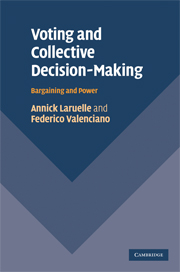4 - Bargaining committees
Published online by Cambridge University Press: 28 July 2009
Summary
This chapter addresses voting situations in which a committee bargains in search of agreement over a set of feasible alternatives ‘in the shadow of a voting rule’. More specifically we consider a ‘bargaining’ committee that makes decisions in an environment such as the one described in Section 2.2. In particular we are interested in the role and influence of the voting rule on the outcome of negotiations in order to assess the adequacy of a voting rule in different contexts.
In Section 4.1 we describe the environment of what we call a ‘bargaining committee’ and in Section 4.2 a model for such a committee is presented. The situation is modelled by the two basic ingredients that specify it: the voting rule that prescribes what coalitions can enforce an agreement, and the voters' preference profile. The situation summarily described by this two-ingredient model is then analysed using two approaches. The question of what agreements are likely to arise in such situation is addressed first in Section 4.3 from a cooperative-axiomatic game-theoretic point of view, as an extension of Nash's bargaining theory. That is, by imposing reasonable conditions for an agreement among rational individuals the class of admissible agreements is drastically narrowed and characterized. The same question about reasonable agreements is then approached from a non-cooperative game-theoretic point of view in Section 4.4. That is, the decision-making process in a bargaining committee is modelled as a non-cooperative game.
- Type
- Chapter
- Information
- Voting and Collective Decision-MakingBargaining and Power, pp. 105 - 135Publisher: Cambridge University PressPrint publication year: 2008



